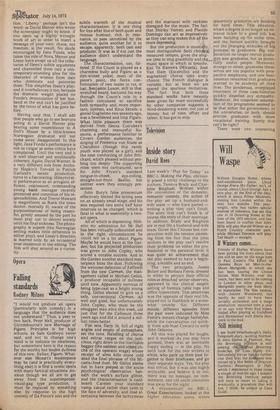Opera
Falling standards
Rodney %Ines
"I would not produce an opera (particularly with comedy) in a language that the audience does not understand." Thus, a year or two back, Peter Hall, producer of Glyndebourne's new Marriage of Figaro. Principles is for high schools, as Sam Goldwyn never said, and not to change one's mind is to indicate its smallness, but somewhere here is the reason for the worthy but leaden dullness of this new, Italian', Figaro. Whatever else Mozart's masterpiece may be (and is practically everything else) it is first a comic opera with many farcical situations. Anxious though we all are to get away from the superimposedvisual-gag type production, it must be replaced by something else, by response to the high comedy of Da Ponte's text and the
subtle warmth of the musical characterisation. It is one thing for line after line of both quiet and riotous humour, rich in resonance, to pass unnoticed by the audience, quite another for it to escape, apparently, both cast and producer. It was as if not just the audience didn't understand the language. The characterisation, too, faltered. If the Count is played as a
charmless bully and Figaro as a dim-witted yokel, most of the piece's point, the fierce confrontation of two males in rut, is
lost. Benjamin Luxon, still in that wretched beard, hectored his way through the Count's role in a fashion calculated to sacrifice both sympathy and, more important, interest, and Knut Skram, a genial Guglielmo two seasons ago,
was a bewildered and limp Figaro. What little pleasure there was
derived from Ileana Cotrubas's charming and resouceful Susanna, a performance familiar to Covent Garden audiences, the singing of Frederica von Stade as Cherubino (though this randy youth was played as a girl), and the neat conducting of John Pritchard, which pleased without probing too deeply. The supporting roles were not caricatured, save for John Fryatt's standard tongue-in-cheek, eye-rolling, straight-out-front Basilio, but neither were they strongly presented.
John Bury's false proscenium effectively limited the acting area on an already small stage, and his sets required two extra half hour intervals to be changed, which is fatal in what is essentially a twoact opera.
All of which is depressing. Hitherto my admiration for Mr Hall has been virtually unbounded and in the right circumstances he could tell us a lot about Figaro. Maybe he would have at the Garden; but his projected production was given to John Copley, who scored a notable success. And at the Garden another standard masterpiece bites the dust. Following the welcome defection of Zeffirelli from the new Carmen, the management called in Michael Geliot, a producer incapable of dullness until now. Apparently nervous of being type-cast as a bright young thing, Geliot elected to give us a safe, conventional Carmen. All well and good, but unfortunately John Copley, who must be the smuggest man alive this week, did just that for the Coliseum three years ago and did it around a million times better.
Flat sets, flatly lit, full of right angles and empty of atmosphere, set the tone. Handling of chorus
and extras verges on the ludicrous, right down to the inevitable
beggar (the saddest and oldest cli ché of the operatic stage) whose receipt of alms kills stone cold dead the final phrases of the Mi.
caela/Jost duet. Mr Geliot seems not to have peeped at the acute
psychological observation ben eath the work's surface glitter, and the characterisation is card
board: Carmen your standard vamp, casual rather than calm in the face of adversity, and Jose alternating between the lachrymose
and the maniacal with reckless disregard for the music. The fact that Shirley Verrett and Placido Domingo can act as impressively as they can sing makes this all the more depressing.
But the production is musicaIly most distinguished. Solti chopte.x measured tempos, gives the singers time to sing gracefully and the—.
music space in which to breathe. Kin i Te Kanawa (Micaela), Jose Van Dam (Escamillo) and the augmented chorus take every chance. The French dialogue is variable, but at least we are spared the spurious recitatives. The fact that both these standard works have recently been given far more successfully by other companies suggests a mind-deadening waste, not just of money, but of time, effort and talent. It has got to stop.






























 Previous page
Previous page